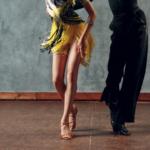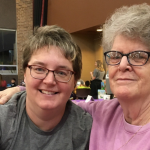Hannah Pagalunan – Adapt, Embrace and Have Faith
This week, Hannah Pagalunan shares how she copes with her recent ARCA1 diagnosis and how faith helps her to find her way.

I was diagnosed at the age of 28 in 2020. After years of being passed from specialist to specialist and countless diagnostic tests, my neurologist finally sent off my blood to Finland and I was diagnosed with ARCA1.
My life was mostly revolved around work, home, and church. I did like playing sports and trying different activities when I could. I’m a bit more cautious and fearful now, but I try to find ways to adapt to the changes and still do the things I want to do. I guess it’s my competitive spirit that prevents me from trying things right now. My brain goes into overdrive and I get fearful about the thought of losing or making a fool out of myself when trying new activities.
I find that memorization helps. I enjoy singing and playing the piano, but because I can no longer do those AND read the sheet music at the same time, I find myself just memorizing the notes and words. I think that helps, in general, in keeping my mind sharp and it allows me to still do what I want to do. Of course, I have very limited experience, but what I find helpful is to figure out other ways in doing the things you love to do. Life doesn’t stop here. It just gives you a new opportunity to find new things you can enjoy.
Other “activities” that I find very helpful are prayer and Bible reading. As I mentioned in the previous question, one main constant in my life is the church. I value and prioritize my relationship with God a lot. I would be lying if I say that I don’t have any hard days; I do. Some days are harder than others, but praying and reading my Bible encourage me and give me a different perspective in my life.
One main thing that my disability has taught me is the importance of paying attention to one task at a time. Prior to showing symptoms, I enjoyed multitasking. I actually still enjoy it now, to a certain extent. But one day, I had a hard time doing something that I did all the time (reading and walking), which made me realize that I’d been dividing my attention to do multiple tasks. Yes, learning to focus on one thing at a time will keep us safe, but I think this realization helped me in the way I approach certain things. Not just physical activities, but also the circumstances I face in life.
I think just having it has raised my family’s and friends’ awareness. I simply tell them what I have and what general ataxia is. If they ask more questions, I answer them. If I don’t have the answer, I research it and tell them. So far, I haven’t done anything particularly big, but I think that starting with myself and my core bubble is a good step.
As I mentioned, I haven’t had the diagnosis for a long time, but one thing that’s standing out to me right now is to look at it in a positive light. If you feel like crying, cry it out. If you feel like screaming, scream it out. Embrace those emotions, but don’t let yourself live in those emotions. Don’t let your emotions and your condition define who you are. Like I said earlier, I value my faith a lot. I have a relationship with Christ, so I find comfort in that. For me, my hope is found in God and if you want to know more about that, you can ask me. One Bible verse that’s encouraged me all these years is Psalm 61:2, “From the end of the earth will I cry unto thee, when my heart is overwhelmed: lead me to the rock that is higher than I.“
I think it’s important to find something or someone that can bring you comfort and encouragement. Find new things to enjoy or find other ways to keep doing the things you enjoy. I can only tell you my experience and what’s important to me, but I realize that my story is different than yours. Nevertheless, I hope that you can find something helpful here.

Thank you Hannah Pagalunan for your encouragement and your comforting words!
Please consider sharing your story – whether you have Ataxia, are a caregiver, friend, or relative. You may fill out the form below to get started.




